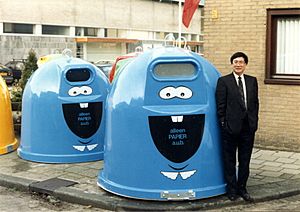Social responsibility facts for kids
Social responsibility means caring for our community and the world around us. It's about working together with others to make sure the world is a good place for everyone, especially for future generations. It's like being a good neighbor, not just to the people next door, but to the whole planet!
Contents
What is Social Responsibility?
Social responsibility is a duty everyone has. It's about finding a good balance between making money (the economy) and protecting our environment. Sometimes, people think that making a lot of money means we have to harm the environment or society. But social responsibility teaches us to find ways to grow without causing harm.
This idea isn't just for big companies. It's for everyone whose actions affect the world. For example, it means making sure people in rural areas can get good healthcare. It also means keeping our parks and oceans clean. Imagine if everyone worked together to stop plastic from getting into the ocean!
You can be socially responsible in two ways:
- Passively: This means avoiding things that hurt society, like not littering.
- Actively: This means doing things that help society, like volunteering for a clean-up.
Social responsibility is also about thinking long-term. What we do today affects people who will live here in the future. So, we need to make choices that help everyone, now and later.
History of Social Responsibility
The idea of social responsibility has been around for a long time. In 1953, an American economist named Howard Bowen wrote a book called "Social Responsibility of the Businessman." This book was one of the first to really talk about how businesses should be responsible to society.
Businesses and Social Responsibility
Many businesses today think about corporate social responsibility (CSR). This means companies make choices that are good for society and the environment, not just for their profits.
When companies make ethical choices, it can prevent problems. For example, if a company follows rules about pollution and listens to the community, government agencies might not need to investigate them as much. Some people believe that if companies act responsibly, there will be less need for strict government rules.
Some people used to argue that a company's only job was to make money for its owners. But many studies now show that being socially responsible can actually help companies make more money. When a company has a good reputation for caring, people are more likely to buy their products.
There are even special certifications, like those from Underwriters Laboratories or Green Seal. These help companies show that their products are made in a socially responsible way. This helps customers choose products from companies that care about people and the planet.
Scientists, Engineers, and Responsibility
Scientists and engineers create amazing new things, from medicines to robots. But are they responsible for what happens if their inventions are used in a bad way?
Many people believe that if scientists are proud of the good things they create, they should also think about the possible negative effects. Scientists and engineers often help plan big research projects, even for military technologies. Many professional groups, like the National Academy of Sciences, have rules about how to do scientific research ethically. They believe scientists have a special responsibility because their work can have such a big impact.
It can be tricky, though. Sometimes, it's hard for one person to control how a new invention is used, especially in big companies. Also, scientists might not always know how their discoveries will be used in the future. For example, a scientist doing basic research might not imagine all the ways their findings could be applied.
However, if a scientist knows their work could be used for something harmful, they have a greater responsibility. As one expert said, "Ignorance is not an excuse precisely because scientists can be blamed for being ignorant."
Another point is that those who pay for the research often have a lot of control. Governments and corporations fund most scientific studies today. So, taxpayers and politicians might also share responsibility for how science is used.
Organizations like UNESCO and the International Organization for Standardization are working to create guidelines. These guidelines encourage everyone, including businesses and governments, to be more socially responsible.
See also
 In Spanish: Responsabilidad social para niños
In Spanish: Responsabilidad social para niños
- Accountability
- Corporate social responsibility
- Inclusive business
- SA8000
- Shareholder primacy
- Social enterprise
- Social entrepreneurship
- Socially responsible investing
 | Precious Adams |
 | Lauren Anderson |
 | Janet Collins |



